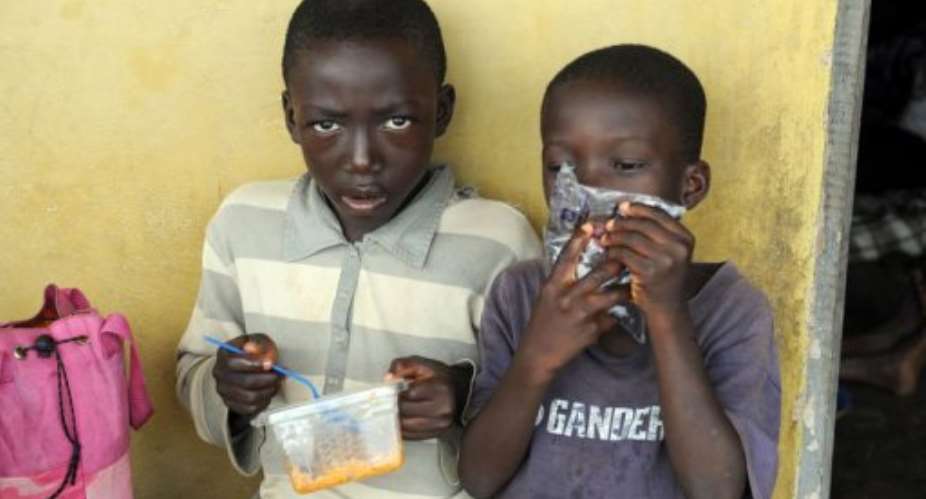IBADAN, Nigeria (AFP) - Flooding that killed more than 100 people in the southwestern corner of Nigeria led to a scramble on Thursday to provide badly needed relief supplies, with homes and bridges collapsed.
Families in the city of Ibadan whose homes were washed away moved in with neighbours or slept on mattresses at a school transformed into a displaced camp while aid officials rushed out medicine, food and other supplies.
Water was subsiding after the heavy rains that began on Friday and continued into Saturday, causing a dam to burst.
The Red Cross has said at least 102 people were killed. Residents said the water rose quickly in the middle of the night between Friday and Saturday, causing them to run for shelter.
"I was sleeping with my family when suddenly one of my children woke up and shouted, 'Daddy! Water!'" said Caleb Babatunde, a 45-year-old father of five who had taken shelter with his family at a school.
"Before we realised it, our rooms had been flooded. We then tried to run for our dear lives."
He said when they returned the next day, they found that their house had collapsed.
One-hundred-six families had been registered at the school for a total of around 500 people.
Houses and other buildings alongside the Odo Ona River in the city of Ibadan, a sprawling metropolis and traditional political base for the Yoruba, one of Nigeria's three main ethnic groups, were destroyed in the rush of water.
The main newspaper in Ibadan carried photographs of dead bodies left behind by the floods last weekend and mass burials were held for victims.
Festus Adedayo, a spokesman for the governor of Oyo state, where Ibadan is the capital, blamed houses and other structures built illegally along waterways as a main cause of the flooding since he said they restricted the movement of water.
"It was a real tragedy," he said. "If figures coming in are really to be believed, then it was a disaster."
Red Cross official Umar Mairiga said the Eleyele dam had burst.
"I lost my neighbour, a mother, and her child to the flood," said Ramon Olabitan, 35, speaking from where his home used to be located alongside the Odo Ona River.
"They were swept away on Saturday night. The wall of the house fell and both of them and their property were washed away. Now even my house is completely destroyed. I have nothing."
Residents constructed makeshift wooden bridges and, for those who lost everything, wondered what to do next.
"We lost our church ... which also served as our home," said Olayawola Taiwo, a 46-year-old pastor.
"Myself and members of our church are now here because we have nowhere to go ... We want government to provide us with an accommodation because we have nothing left."
Flooding occurs each rainy season in Nigeria, though emergency officials have warned of particularly intense rains this year. The rainy season typically runs from around April to September.
The largest cities in Nigeria, Africa's most populous nation, are overcrowded, with many residents living in haphazardly constructed slums. Drainage systems are also often poorly maintained and contribute to the problem of floods.
© 2011 AFP





 Meta releases new version of conversational AI across its platforms
Meta releases new version of conversational AI across its platforms
 Cape Town named Africa’s Best Airport 2024 by Skytrax
Cape Town named Africa’s Best Airport 2024 by Skytrax
 Bono East: Four injured after hearse transporting corpse crashes into a truck
Bono East: Four injured after hearse transporting corpse crashes into a truck
 ‘Be courageous, find your voice to defend our democracy’ — Sam Jonah urges journ...
‘Be courageous, find your voice to defend our democracy’ — Sam Jonah urges journ...
 Exodus of doctors, nurses and teachers have worsened because of unserious Akufo-...
Exodus of doctors, nurses and teachers have worsened because of unserious Akufo-...
 2024 election: Avoid insults, cutting down people in search of power – National ...
2024 election: Avoid insults, cutting down people in search of power – National ...
 ‘You passed through the back door but congratulations’ — Atubiga on Prof Jane Na...
‘You passed through the back door but congratulations’ — Atubiga on Prof Jane Na...
 Government’s $21.1 billion added to the stock of public debt has been spent judi...
Government’s $21.1 billion added to the stock of public debt has been spent judi...
 Akufo-Addo will soon relocate Mahama’s Ridge Hospital to Kumasi for recommission...
Akufo-Addo will soon relocate Mahama’s Ridge Hospital to Kumasi for recommission...
 We must not compromise on our defence of national interest; this is the time to ...
We must not compromise on our defence of national interest; this is the time to ...
